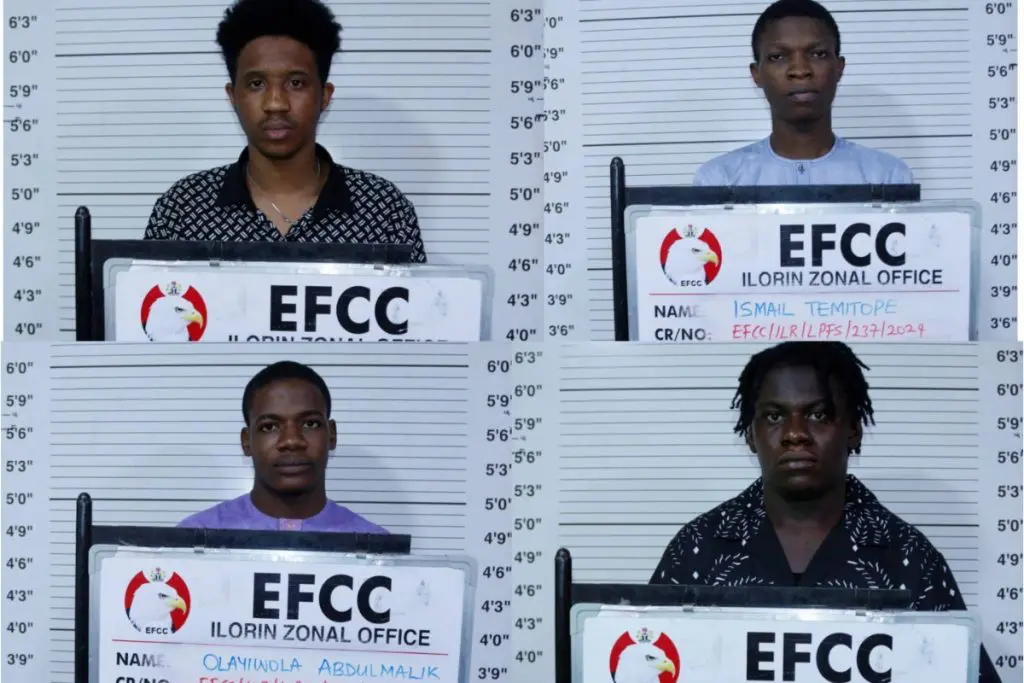The fight against internet fraud in Nigeria took another significant step as six individuals were convicted and sentenced to prison by two courts in Kwara State. On October 14, 2024, the Economic and Financial Crimes Commission (EFCC), Ilorin Zonal Directorate, successfully secured the convictions of Idris Muhammed, Ismail Temitope Mustapha, Oyekola Odunayo, Anthony Sylvester Stephen, Timilehin Adeniyi, and Olayiwola Ayomide Abdulmalik.
These individuals were sentenced by Justices Sulaiman Akanbi and Adebayo Yusuf at the Kwara State High Court in Ilorin. The cases show how internet fraudsters exploit online platforms to deceive unsuspecting victims, many of whom are from foreign countries.
Justice Sulaiman Akanbi presided over the cases of Idris Muhammed, Ismail Temitope Mustapha, Oyekola Odunayo, and Anthony Sylvester Stephen. Justice Adebayo Yusuf heard the cases of Timilehin Adeniyi and Olayiwola Ayomide Abdulmalik.
Idris was charged with using a fake identity to deceive an individual named Lavergne Adriana Racheal. Idris impersonated someone called Dorthy Palmer and convinced his victim to send him $600 through a cash app between July 13 and August 13, 2024. This action was in violation of Section 321 of the Penal Code, which relates to cheating by personation.
Upon his conviction, Idris was sentenced to two years in prison. However, the court provided an option for him to pay a fine of N100,000 instead of serving the full term. Additionally, Idris was ordered to forfeit his iPhone 13 and the $300 he raised as partial restitution to the Federal Government.
Ismail was involved in a similar scam, where he impersonated “Myre Roddy” on TikTok. He used this false identity to trick an individual named Ron Woldron into sending him $500 in Apple gift cards between 2022 and 2023.
Ismail was sentenced to one year in prison or an option of paying a N100,000 fine. His iPhone 11 Pro Max and $300 were also forfeited to the government as restitution for his crime.
Oyekola faced multiple charges for his involvement in internet fraud. He was convicted on three counts:
- Count one: One year imprisonment with the option to pay a N100,000 fine.
- Count two: Two years imprisonment, which can be avoided by paying a N200,000 fine.
- Count three: Two weeks of community service and a fine of N50,000.
The court also ordered the forfeiture of $300 and N34,900 recovered from him during his arrest. This highlights the multiple fraudulent schemes he participated in and his attempt to cheat various individuals.
Anthony was charged with a simpler case, where he benefited $25 from his unlawful activities. Despite the small amount involved, the court sentenced him to one year in prison with an option to pay a N50,000 fine. The court also seized his iPhone 12 and $25 as part of the judgment.
The duo of Timilehin and Olayiwola were convicted by Justice Adebayo Yusuf. Both individuals were sentenced to six months imprisonment, but they were given the option of paying a N200,000 fine each to avoid jail time. As part of the judgment, their phones and the money they provided as restitution were also forfeited to the Federal Government.
The EFCC continues to play a leading role in the fight against cybercrime in Nigeria. The arrests and convictions of these six individuals are part of a broader crackdown on internet fraud, commonly known as “Yahoo Yahoo” in local parlance. The EFCC has repeatedly warned young Nigerians about the consequences of engaging in internet fraud, and this case serves as a clear example of the legal repercussions that come with such activities.
Cybercrime has become a significant challenge in Nigeria, with many fraudsters targeting international victims. The consequences extend beyond personal financial loss, as they tarnish the reputation of Nigeria on the global stage. The EFCC’s actions, such as those seen in Kwara State, demonstrate that law enforcement agencies are determined to curb these activities.
In addition to their jail sentences or fines, the court ordered that the phones used in the fraudulent activities, including iPhones 11, 12, and 13, be forfeited to the Federal Government. The money illegally obtained or raised as restitution was also confiscated. This ensures that the criminals not only face time behind bars or pay fines but also lose the tools and profits gained from their criminal actions.







